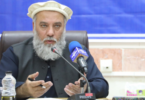Zahra Rashidi
Mursal, a 27-year-old woman from Mazar-i-Sharif city, lives in its alleys. She sacrificed her life to care for her elderly mother’s medical needs by marrying a man 43 years her senior.
As someone who has long described current conditions, I find myself incapable of writing Mursal’s narrative. The reality that shapes her life, revolving around compulsion, disability, and perpetual deprivation, is not easy for me. She resides on the outskirts of Mazar-i-Sharif, with her story portraying a blend of coercion, disability, and perpetual deprivation.
Struggling to cope with her mother’s illness while her father, a vendor, lacked the funds for her treatment, Mursal heeded the advice of her relatives to marry a man seeking a fourth wife. Mursal, originally set to marry a 70-year-old man, didn’t expect happiness with a man of her age. Affected by polio as a child due to her family’s neglect, she now faces mobility challenges. According to research following the Taliban’s rise, forced and early marriages, and gender-based violence in Afghanistan have significantly increased. Mursal does not see herself as a victim of any of these types of marriages, but her sacrifice for her mother’s treatment remained futile as her mother succumbed to her illness.
Mursal, a young woman, married an “old man,” as she describes it. She feels embarrassed about the marriage and doesn’t tell any of her friends about her intentions to marry, fearing ridicule. She married without a wedding celebration. She believed she had no other choice as her mother suffered from a debilitating illness. She completed her education and graduated from an institute in Balkh. She now lives with a man who, apart from Mursal, has three other wives and children from previous marriages. Mursal refers to her husband as a “merchant” who spends most of his time in Uzbekistan. She consented to the marriage to ensure her mother’s treatment, but nothing went according to plan, and her mother passed away.
She considers herself and her husband from different generations with stark differences. Even in these circumstances, she sees no better option and has decided to continue this life. She says, “Starting over at my father’s house with this illness is not favourable. So, I have to endure it.”
Mursal recounts the violence she endures, stating that she is physically assaulted at her husband’s house, and subjected to verbal and psychological abuse. She describes life in her husband’s home: “Sometimes I feel like he married me for cleanliness, laundry, and cooking.”
Forced marriages with significant age differences have long been prevalent in Afghan society. Poverty, low literacy rates, and years of war and conflict are primary factors driving young girls to marry older individuals.
With the Taliban’s rise, the factors contributing to this crisis, including poverty and illiteracy, have increased, leading to forced marriages and gender-based violence.
Khaama Press







